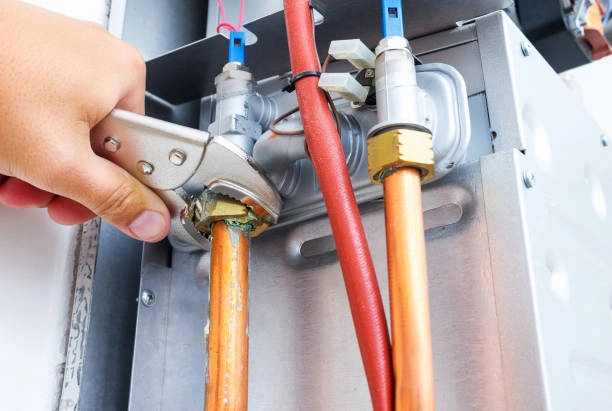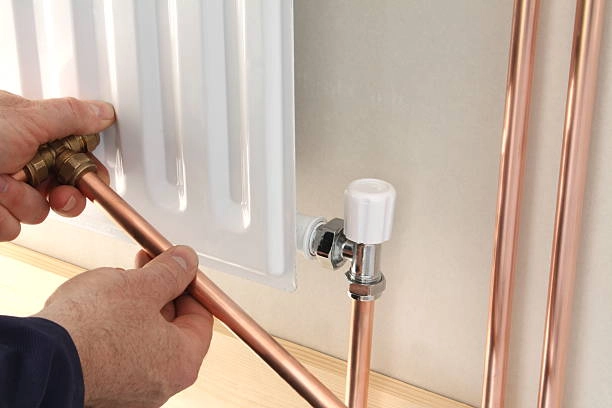Heating system installation is an important decision for any homeowner. A good heating system makes your home warm during cold weather and can also make it more energy-efficient. When it comes to installation, homeowners tend to wonder if they should do the job on their own or seek professional services like those of Tornado HVAC. Knowing both the advantages and disadvantages of both situations will enable you to make a well-informed choice that best fits your home and finances.

The Allure of DIY Heating System Installation
DIYs are enticing, particularly if you desire to be economical or revel in handling home improvement work. A few householders find that installation is an achievable DIY activity, especially when they possess certain technical know-how and a collection of essential tools.
Advantages of DIY Installation:
Cost Savings: The most visible advantage of having a DIY installation of a heating system is minimizing labor expenses. You may save money by buying the equipment yourself and installing it compared to engaging professionals.
Flexible Schedule: Conducting the installation yourself means working on your time schedule, circumventing the process of booking a session with a professional service organization.
Sense of Accomplishment: A successful heating system installation can be a source of pride and your confidence in handling home improvement projects.
Disadvantages of Do-it-Yourself Installation:
- Lack of Expertise: Installation of heating systems entails sophisticated steps such as gas line connection, electrical wire handling, and airflow provision. Installation mistakes may cause performance problems, safety risks, or expensive repairs.
- Time-Consuming: The installation of a heating system by an inexperienced individual usually takes more time than expected. Without sufficient knowledge, you might experience hitches that will extend the work.
- Voided Warranty: Some heating systems call for professional installation to ensure that the manufacturer’s warranty is in effect. When you choose to install it yourself and something malfunctions later on, you could be forced to pay for the repairs out of pocket.
Why Professional Heating System Installation Stands Ou
While DIY installation can be possible for some small home upgrades, installation is a task that should be left to experts such as Tornado HVAC. Professional technicians make sure that the system is properly installed and runs efficiently from day one.
Benefits of Professional Installation:
- Correct Assessment: Experts assess your home’s size, insulation, and ductwork prior to starting the heating system installation. This makes sure that you receive the appropriate system that is appropriate for your home’s heating requirements.
- Technical Expertise: Certified technicians understand the intricacies of heating systems, from traditional furnaces to heat pump installation. They know how to handle gas connections, electrical components, and ventilation safely.
- Efficiency: A professional heating system installation is typically completed faster than a DIY project. Experts work efficiently to get your system up and running, reducing downtime and keeping your home comfortable.
- Warranty Protection: Letting experts do the installation usually safeguards your manufacturer’s warranty. In case of problems, you can count on assistance without fear of voided coverage.
- Post-Installation Support: Companies such as Tornado HVAC provide continuous support and maintenance after installation. If you require assistance with heat pumps installed or thermostat adjustments, experts are a phone call away.

The Complexity of Heat Pump Installation
Heat pumps are increasingly becoming popular because they are energy-efficient and can deliver heating and cooling. Heat pump installation, though, is not as simple as some people may assume. It involves installing both indoor and outdoor units, refrigerant lines, and proper airflow.
Even veteran DIY enthusiasts will find it difficult to install heat pump systems due to the technical procedures. Improper heat pump installation can cause efficiency losses, refrigerant leakage, or malfunction of the system. Heat pumps installed in residences by trained professional technicians work at maximum capacity.
Differences Between Professional Installation and DIY Installation
- Safety: Professional heating system installation puts safety first. Working with gas lines, electrical wiring, and ventilation systems without training is hazardous. Professionals ensure safety procedures to avoid leaks, fire risk, or carbon monoxide poisoning.
- System Longevity: The longevity of your heating system depends on proper installation. A system professionally installed by a company such as Tornado HVAC will most likely operate effectively for years without requiring repairs and with lower energy consumption.
- Energy Efficiency: Inadequate installation of the heating system can result in air leaks and poor performance, raising your energy bills. Professionals seal and calibrate everything properly, maximizing the performance of the system.
- Local Codes and Permits: Most jurisdictions have permits and code requirements for installation. Professionals know about these codes and ensure your installation is up to code and meets all legal standards.
When DIY May Be Appropriate
Although heating system installation should be left to the professionals, there are some small tasks that homeowners can do themselves:
- Changing air filters
- Cleaning vents and ducts
- Installing a smart thermostat (with instructions)
- Conducting visual checks
These small maintenance tasks can enhance the efficiency of your heating system without professional help. Anything more than simple maintenance is best left to the experts.
Cost Considerations
While installing a heating system yourself might appear to be inexpensive at first, it can translate into increased expenses down the road if it is done incorrectly. Incorrect installation could lead to system breakdowns, decreased efficiency, or damage requiring professional service. Having professionals such as Tornado HVAC install ensures that the system is installed correctly the first time, possibly saving you money throughout the life of the system.
Making the Right Choice
When choosing between professional and DIY installation of heating systems, think about your technical knowledge, the time available, and the complexity of the system you intend to install. If you lack knowledge about HVAC systems, then professional installation is the better and safer option.
The installation of heat pumps, especially, requires accuracy. Having experts manage a heat pump installation as part of your heating system installation guarantees smooth operation of the system, resulting in consistent warmth and cool temperatures throughout the entire year. With efficient heat pumps installed, talented technicians can save you from normal problems and promise maximum performance.

Installation of the heating system is an essential investment in your home’s comfort and efficiency in energy. Although DIY activities can be meaningful, the intricacy and risks involved in installing furnaces or heat pump systems usually far surpass the money one could potentially save. Professional installation, particularly from reliable sources such as Tornado HVAC, ensures safety, performance, and efficiency in the long term.
If you’re considering installation or need guidance on heat pump installation, reach out to Tornado HVAC for expert advice and reliable service. Their team is ready to help ensure your home stays warm and efficient, no matter the season. Contact us today to learn more!
Frequently Asked Questions
1. Is it less expensive to install a heating system myself?
Though DIY may appear to be less expensive in the short term, errors result in expensive repairs down the line. Faulty heat pump or furnace heating system installation results in inefficiencies. Having professionals install heat pump systems ensures safe operation and energy cost savings in the long term.
2. How much more complicated is a heat pump installation than a furnace?
Heat pump installation is more involved since it includes installing both indoor and outdoor units, refrigerant line connections, and airflow arrangements. A heat pump install necessitates technical expertise, while a furnace can include primarily ducts and gas lines.
3. Can I invalidate my warranty by installing heat pump systems myself?
Yes, several makers need heat pumps professionally installed by qualified technicians in order to maintain the warranty. Self-installation may invalidate the warranty, and you would have to pay for repairs down the road.
4. How long does professional heating system installation take?
Professional heat system installation would typically take a day or two. Heat pump installation may be longer because there is an added outdoor unit and refrigerant line installation. Using professionals guarantees efficiency in the job.
5. What are the safety issues with installing heat pump systems myself?
DIY installations are dangerous with gas lines, electrical wiring, and refrigerant exposure. Incorrect heat pump installation or heating system installation may result in leaks, electrical shock, or decreased system performance. Professionals adopt safety measures to avoid such problems.
6. Can I install a heat pump if my house already has a furnace?
Yes, a heat pump can be installed when converting from a furnace. The installation could involve duct modifications and the installation of an outdoor unit. Your home can be assessed by HVAC experts to achieve proper heat pump installation for optimum performance.
7. What are some maintenance tasks that I can do myself after having heat pumps installed?
Once heat pumps are professionally installed, you can handle simple operations such as cleaning filters, maintaining outdoor units’ cleanliness, and monitoring airflow. For technical problems or concerns with your heating system installation, professional inspections ensure your heat pump installation remains efficient.
